Were you like me growing up and hated the feeling on Sunday afternoons as the sun set and the shadows lengthened...hated the feeling because you knew where you were headed the next day?
If so, this article is for you! It's for people who hated school but LOVE LEARNING!
School taught us to memorize...(and then forget) that George Washington was the first president, that 6 x 8 = 48, and a million other unintegrated facts, largely useless. That was by design.
Did school never teach you where It came from. No? Why not? It's almost as if it wanted to appear eternal, immutable, everlasting. But that is definitely Not True.
School as we know it today - 12 years of factory-style shifting from room to room, centralized curriculum and national standards - didn't exist 100 years ago. It is quite a new experiment.
Two specific groups are responsible for American schooling. Care to guess who they were? The Founding Fathers? The Ancient Greeks? Good guesses but wrong and wrong!
American schooling was brought to you by:
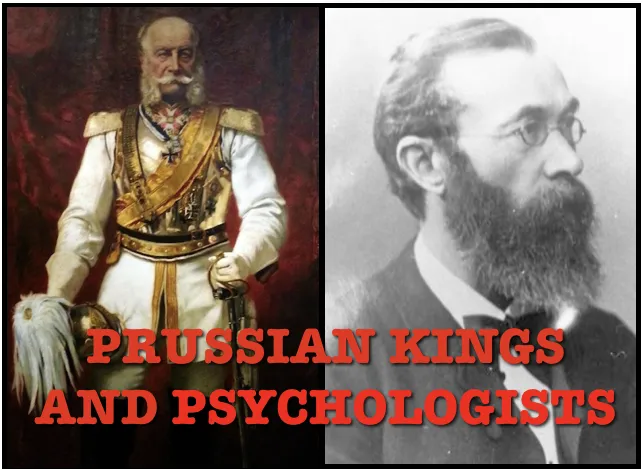
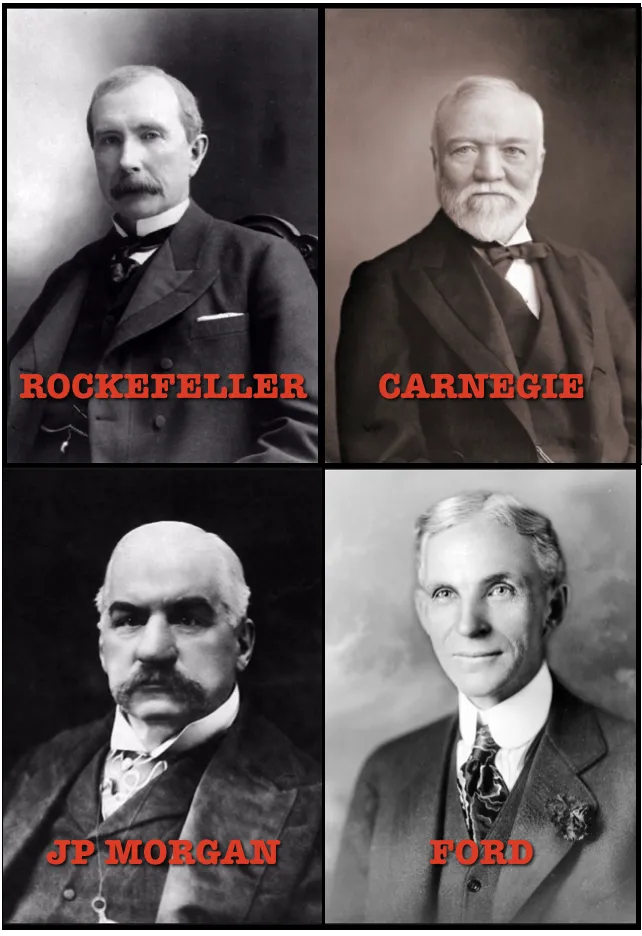
Prussian kings, their psychologists, and these four businessmen (Rockefeller, Carnegie, Morgan, and Ford) did more to form the American system than anyone else.
As we will see, school has been designed not to teach you, but to condition you into thinking certain "proper" beliefs. Those aren't my words, they're the words of Edward Thorndike, psychologist at Columbia University Teachers College, an institution which graduated hundreds of the most influential administrators in the early 20th century.
My name is Michael McGillicuddy and my goal is to live in a peaceful world. That will come when collectively, we manage to elevate our consciousness. Nothing less will do. Therefore, I'm trying to "be the change" by first elevating my own and sharing what I learn along the way.
So let's get into it!

The Origins of American Schools: Prussia
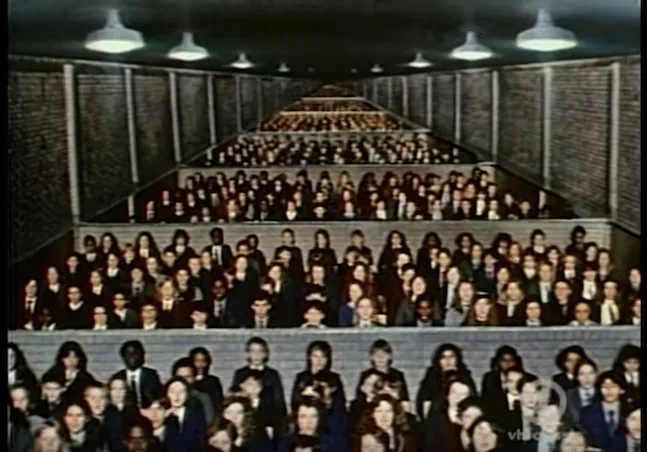
(The school system personified in "Another Brick in the Wall" by the inimitable Pink Floyd. Listen carefully to the words as it describes our schooling.)
The Prussians were a group of militaristic Germans who ruled their subjects with an iron fist and forestalled any attempts at real freedom. Their method? Take children away from their parents and educate them in the way best-suited for the ruling class.
By 1819, Prussia had created the world's first public school system. It was meant to produce the following graduates:
Obedient soldiers for the army.
Obedient workers for the mines, farms, and factories.
Well-subordinated civil servants.
Well-subordinated clerks for industry and business.
Additionally, its goal was to create subjects who thought alike on major issues.
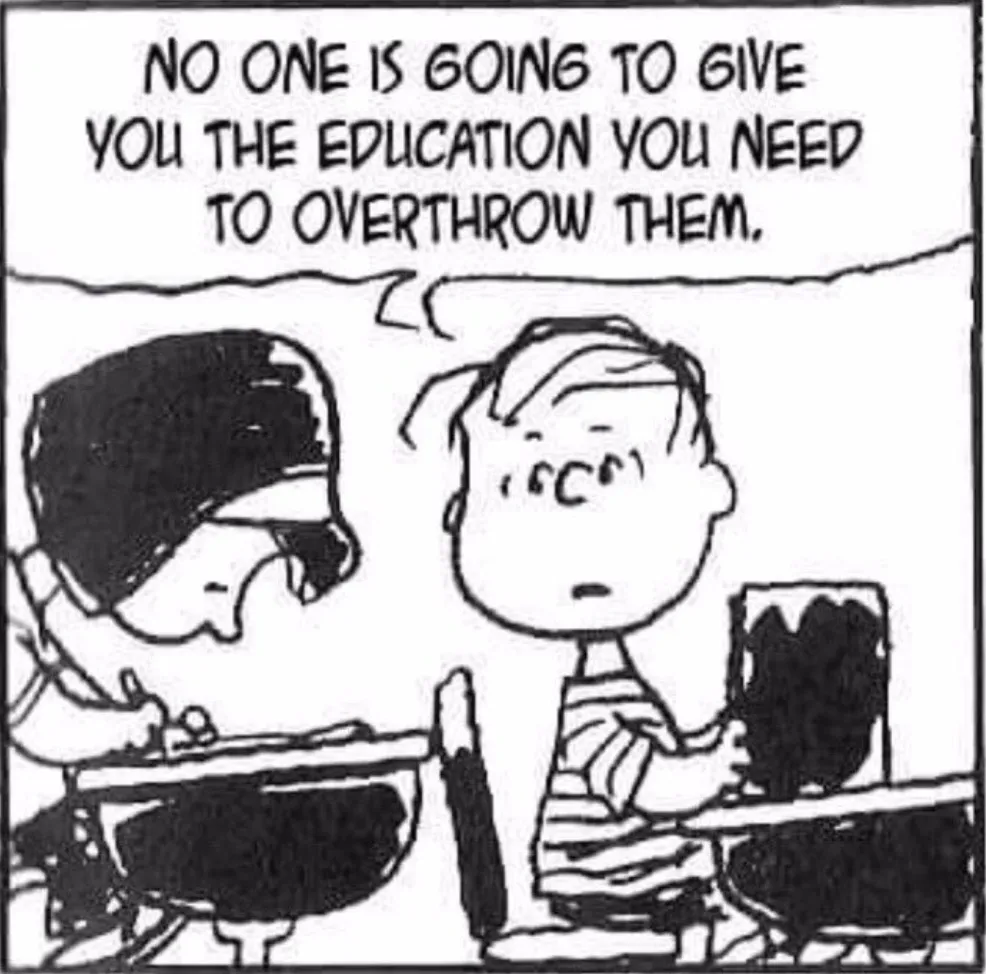
It accomplished those objectives very well. Prussia had no messy Democratic revolutions which troubled other European countries, and few German philosophers are known for their contributions to the rights of the individual or defense of human freedom.
Prussia's "education" model broke down into the following three-tiered pyramidal system:
First were the private Academy Schools for the top 1%. These schools taught students to think holistically; to see the big picture. Graduates of this school became the future policy makers of Prussia and Germany.
Under them were the public Secondary Schools which took the next 5-7% of the population. Students here received a cursory education in thinking, but their "education" was mostly focused on solving problems. They were trained to be managers: Of men, material, and money.
Finally in a pig pile at the bottom were the People's Schools. Here, 92-94% of the population came to learn the state-sponsored myths of history, receive vocational training, and learn the very basics of literacy.
The Prussian school system had one more unstated purpose, one that would also make its way to the American shores: To stratify society, and cement the middle and bottom classes in their place.
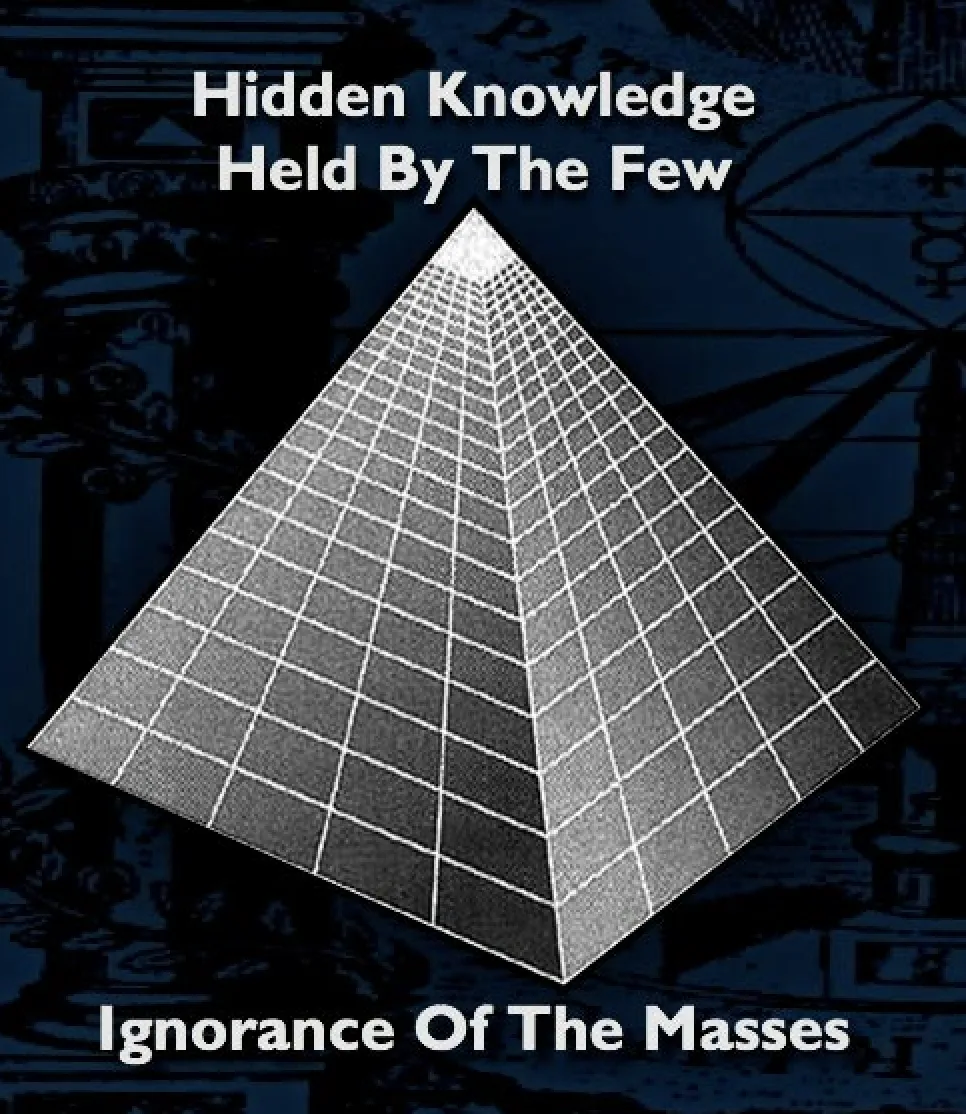
You can hear the echoes of the Prussian school system in a speech given by Princeton President (and future US President) Woodrow Wilson:
We want one class to have a liberal education. We want another class, a very much larger class out of necessity, to forgo the privilege of a liberal education and fit themselves to perform specific difficult manual tasks.
Yes, a future United States president said that.
The Prussians also introduced and promoted a system of early childcare called kindergarten, started by Fredrich Fröbel. For as Ignatius of Loyola, founder of the Jesuit order reputedly said, "Give me the child for the first 7 years and I will give you the man."
Meanwhile in America
Without any national system of schooling, America attained universal literacy. That was unheard of then and still better than today. Alexis de Tocqueville, French diplomat and author of Democracy in America (1835) wrote:
"There is hardly a pioneer's hut which does not contain a few odd volumes of Shakespeare. I remember reading the feudal drama of Henry V for the first time in a log cabin."
At that time, children were educated by parents, priests, one-room schoolrooms with mixed classes, and self-study (today called "Unschooling").
Many of the prominent founding fathers, such as Benjamin Franklin and
George Washington had very little schooling, though their education was rock solid. They educated themselves in the real world, following their passions and would be called unschooled today.
Early on, America had real freedom for most of its citizens. Their lack of a controlled school system was an important factor.
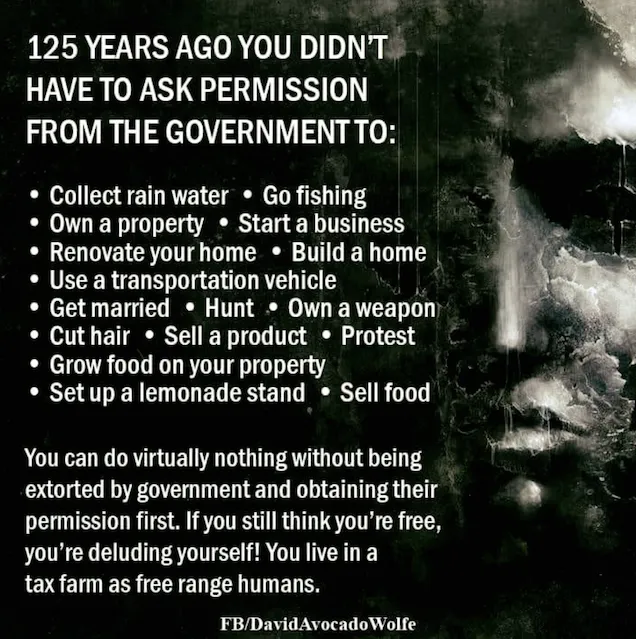
That changed when Massachusetts issued the country's first compulsory schooling law in 1852. The National Guard had to march students to school at bayonet point. Some schoolhouses were burned, teachers beat up, and parents would break into the school and free their child if the teacher held them after class. Other states followed Massachusetts's example despite strenuous opposition everywhere.
"People are Just Little Lumps of Plastic Human Dough"
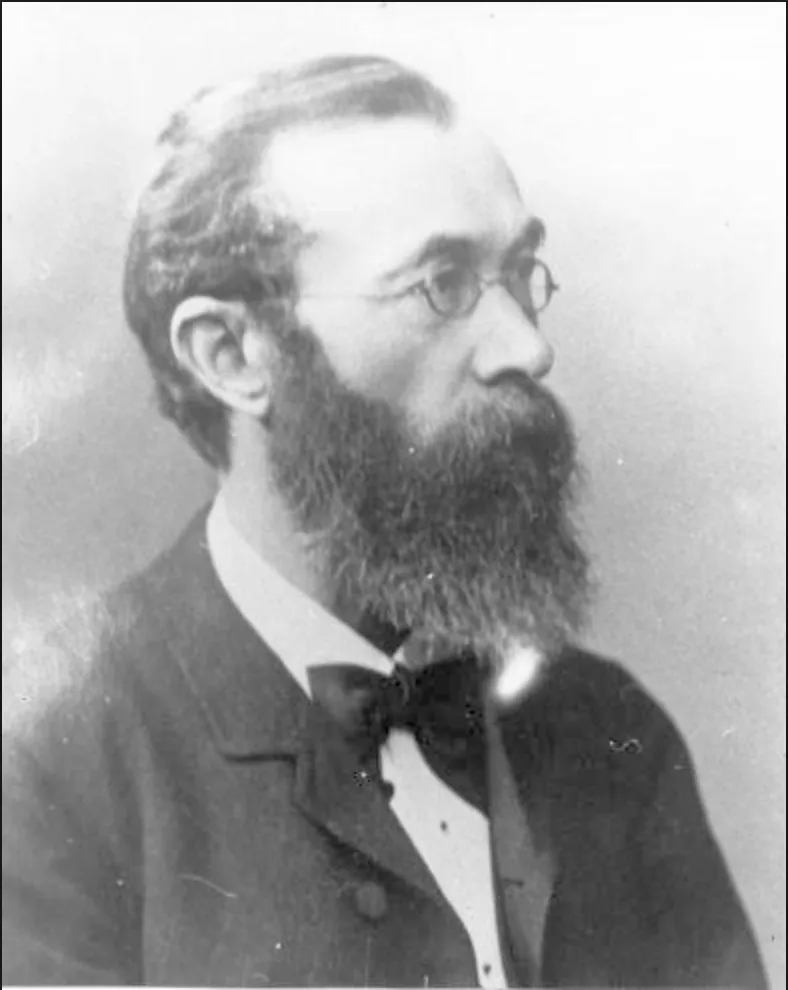
The most influential man you've probably never heard of is William Wundt. He was the first man to call himself a psychologist and was voted the most influential psychologist (Freud was third) recently. He lived and taught in... (where else?) Prussia.
Wundt argued that man was just an animal, a prisoner of his environment, with little ability to control his consciousness or actions. He strongly influenced later psychologists, who later performed lobotomies, electroshocks and more on their patients.
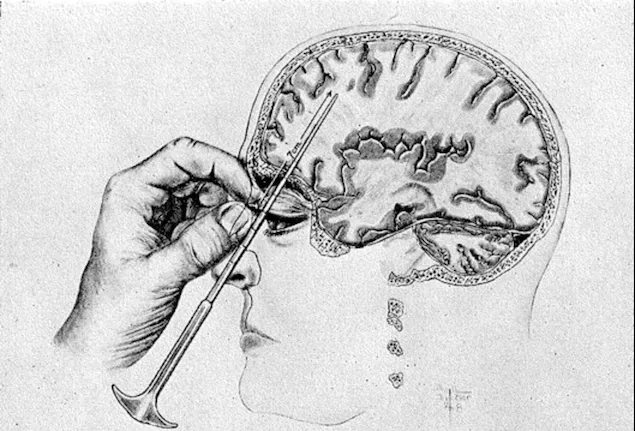
Depicted here is a trans-orbital lobotomy, one of Wundt's and psychology's many "blessings."
Prussia was seen as the home of science in the late 1800s and many young Americans trekked there to obtain its coveted Ph.D.
Below are a few of Wundt's pupils and the men he influenced. After reading this, you might understand better why school is the way it is:
William Torrey Harris: US Commissioner of Education, 1898-1906
- "Ninety-nine [students] out of a hundred are automata, careful to walk in prescribed paths, careful to follow the prescribed custom. This is not an accident but the result of substantial education, which, scientifically defined, is the subsumption of the individual." - Philosophy of Education (1906)
- "The great purpose of school can be realized better in dark, airless, ugly places...it is to master the physical self, to transcend the beauty of nature. School should develop the power to withdraw from the physical world."
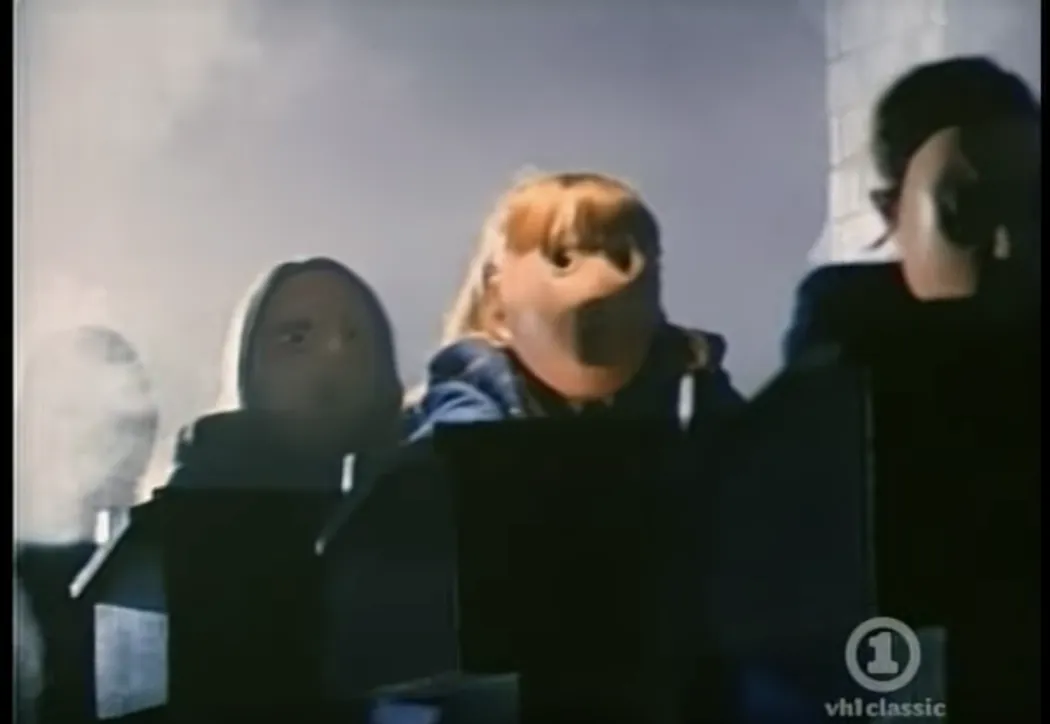
What "The subsumption of the individual in dark, airless, ugly places" might have looked like in Harris's mind. Another evocative shot from Pink Floyd's video The Wall.
Edward A. Ross: Sociologist, University of Wisconsin
"Plans are underway to replace community, family, and church with propaganda, education, and mass media...the State breaks loose from Church, reaches out to School...people are only little plastic lumps of human dough." - Social Control (1901)
John Dewey: Professor, University of Michigan, Chicago, and Columbia
"Every teacher should realize he is a social servant set apart for the maintenance of the proper social order and the securing of the right social growth." Pedagogic Creed (1897)
Edward Thorndike: Psychologist, Columbia University Teachers College
The teacher is there not to teach, but to "Produce and prevent certain responses."
Schools would establish conditions for "selective breeding before the masses take things into their own hands."
Teachers shouldn't teach, but "adjust" individuals.
Elwood P. Cubberley: Dean, Stanford Graduate School of Education
Schools would become factories "in which raw products, children, are to be shaped and formed into finished products...manufactured like nails, and the specifications for manufacturing will come from government and industry." (If students are nails...who's the hammer?)
Would you like any of these men to teach your son or daughter? In a sense, they all did and "adjusted" the nation's way of thinking. Their ideas - though discredited - still hold America's children in their grasp.
Why then has school not changed? The answer is that some men are making a lot of money keeping schools exactly as they are.
Your Education: Kindly Provided by Standard Oil
Good businessmen plan well into the future and want to control as many factors of their business as possible. With forced schooling and its new purpose of "adjusting" children, businessmen like John Rockefeller and Andrew Carnegie saw a golden opportunity.
They had allies had two ultimate objectives:
Produce standardized, obedient workers and consumers.
Destroy future competition.
Through their foundations, these two began to donate lavishly to schools for the ostensible purpose of relieving poverty. In return, these schools would teach what the businessmen wanted them to teach.
The Rockefeller Foundation founded the General Education Board and then bankrolled the University of Chicago and Columbia University Teachers College, which graduated hundreds of teachers and administrators, one of whom said children should be shaped like nails to the specifications of government and industry.
Their influence spread quickly.
In 1917, Senator Chamberlain from Oregon said about the Rockefeller Foundation:
"They are moving with military precision all along the line to get control of the education of the children of the land."
The National Education Association wrote a few years earlier:
"We view with alarm the activity of the Carnegie and Rockefeller Foundations - in their efforts to control the policies of our State educational institutions...to standardize our courses of study, and to surround the institutions with conditions which menace true academic freedom..."
Dumb Them Down
To accomplish the first objective, they turned the school into a factory where kids learned little. In 1917, New York City adopted the Gary System: The Schools of Tomorrow. This called for shortened periods, only 45 minutes in length. Students would shuffle from room to room while teachers - like assembly-line workers - gave the same lecture again and again.
Riots ensued. Parents rightfully suspected their children were being deprived of an education.
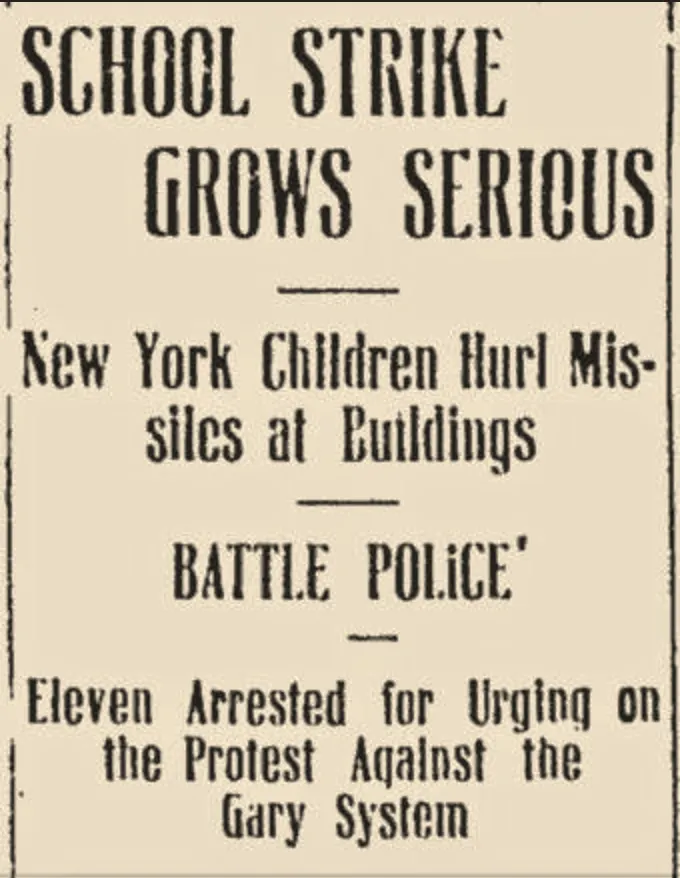
A newspaper headline from that time.
A year later, the new mayor of New York cancelled the plan and called it "a scheme" of the Rockefeller Foundation:
A system by which Rockefellers and their allies hope to educate incoming generations in the 'Doctrine of Contentment,' another name for social serfdom.
If you have doubts, consider this quote from The Rockefeller Foundation's head of Charity, Mr. Gates:
In our dream we have limitless resources, and the people yield themselves with perfect docility to our molding hand. The present educational conventions fade from our minds; and...we work our own good will upon a grateful and responsive rural folk. We shall not try to make these people or any of their children into philosophers or men of learning or of science. We are not to raise up among them authors, orators, poets, or men of letters. We shall not search for great artists, painters, musicians. Nor will we cherish even the humbler ambition to raise up from among them lawyers, doctors, preachers, statesmen, of whom we now have ample supply.
Without education and lacking skills for self-sufficiency typically learned at home, or on the farm, America changed from a nation of independent producers to consumers.
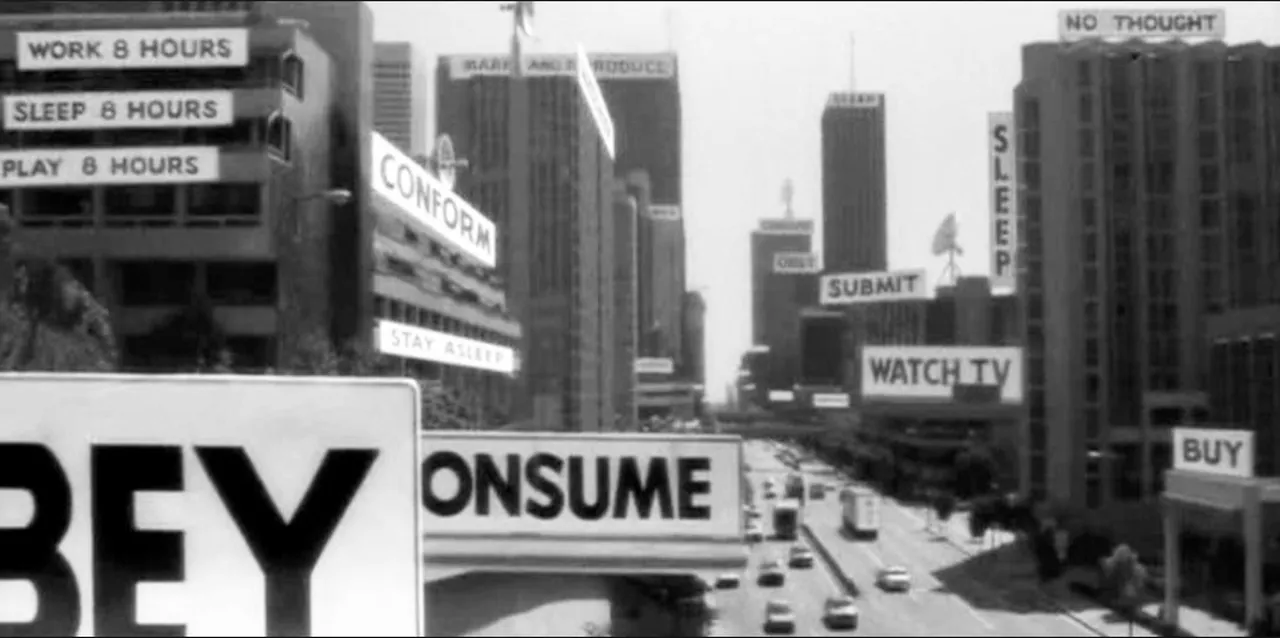
"The Overproduction of Brains"
Going hand-in-hand with creating consumers, the most successful businessmen also worked to change Americans from a nation of entrepreneurs to a nation of employees.
In the book Corporations and the Public Welfare, author James Dill warned that the most important problem of the day was how to get rid of the small entrepreneur.
They argued that too many entrepreneurs would lead to "Overproduction." Publisher Henry Holt said in 1908 that there was "Too much enterprise."
Excessive overproduction of brains was the root cause.

Parents and students rebelled at first, but over time, became worn down and accepted the new conditions. America fell from a nation of universally literate independent citizens to a body of people who barely read and are ridiculed for their sheeplike mentality.
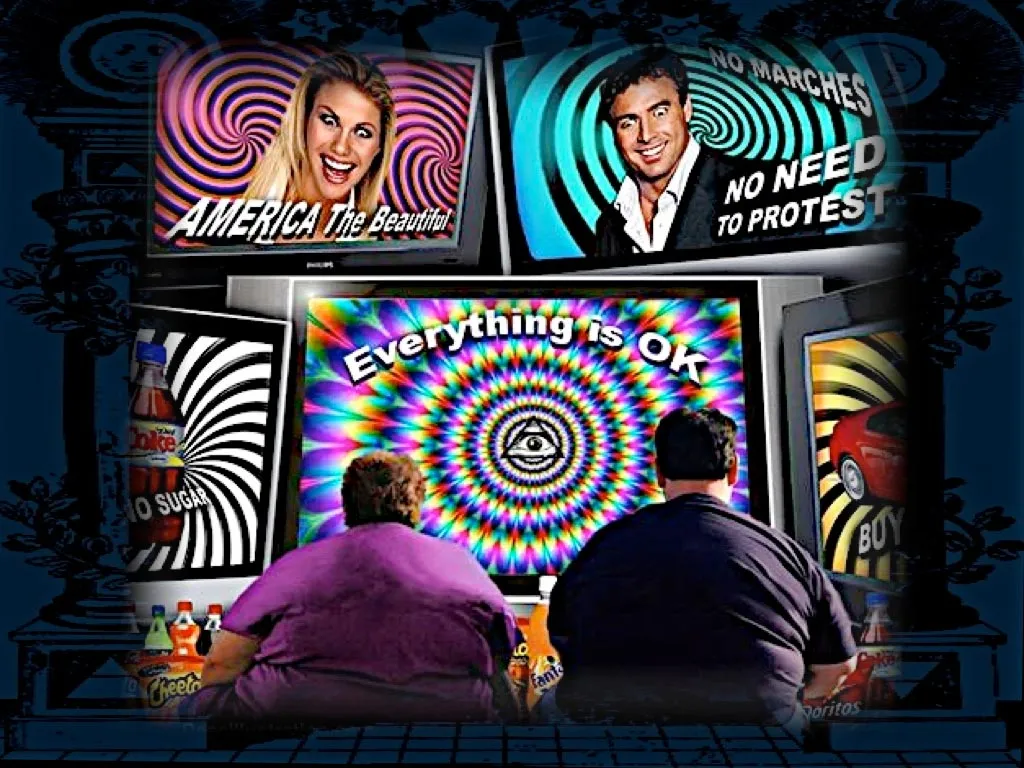
For more information on this, please read The Underground History of American Education by two-time New York Teacher of the Year John Taylor Gatto or former Senior Policy Advisor for Education, Charlotte Iserbyt's The Deliberate Dumbing Down of America.
Control Is The Goal
The object of forced schooling is not education. Americans were better educated and more literate without school than they do with it. The object of schooling is the same as it was back in Prussia: To create obedient workers and soldiers and a citizenry that thinks the same on major issues.
The goal is control: Control over what you and of what your children think. Those which brought you the American education system believe that only the experts should be in charge of what you and your kids learn. Your wants and preferences don't matter. Elwood Cubberley wrote in 1930, "The national need must determine the education provided." Guess who defines what "The national need" is...
Not You
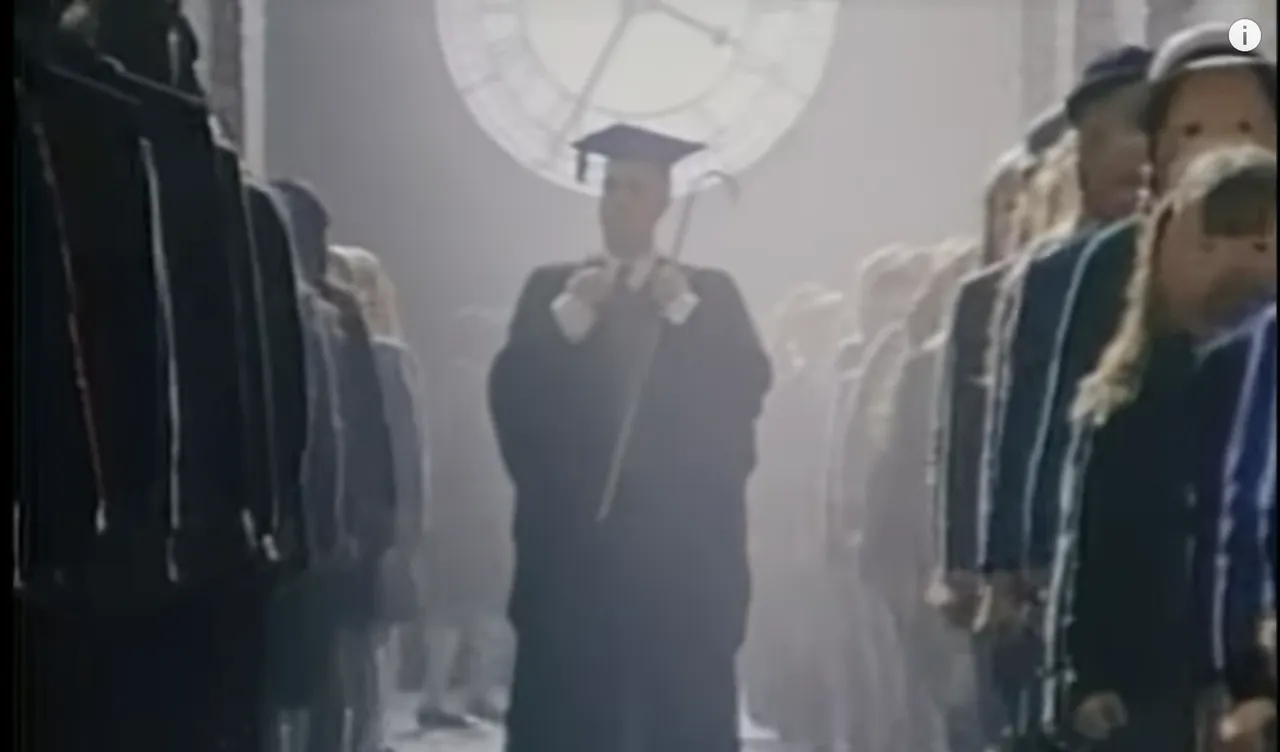
What You Can Do
Knowing this information now gives you power! There is ABSOLUTELY NO NEED for your children to attend public school. Nor is there any need to attend private schools either since they still give the child little to no choice in what they learn.
In my experience, the best and most natural way of education is something called Unschooling. Instead of telling your kids what they will learn, ask them what they are interested in learning? It's worked great for me!
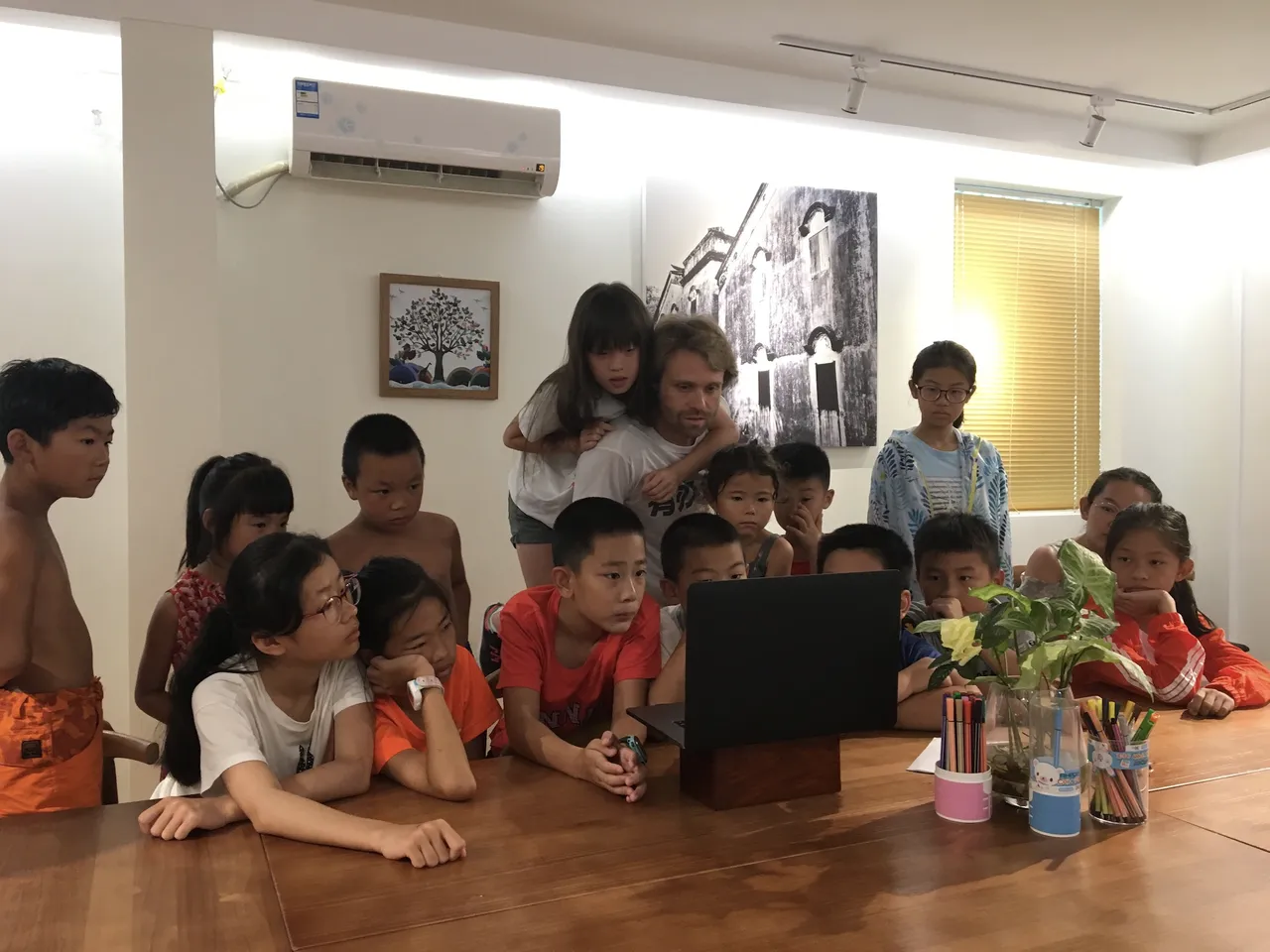
Do you know what the word "school" originally meant? It came from the Greek scholé (σχολή) which meant...free time, leisure.
I kid you not! School meant leisure time: Time to think, reflect, grow.
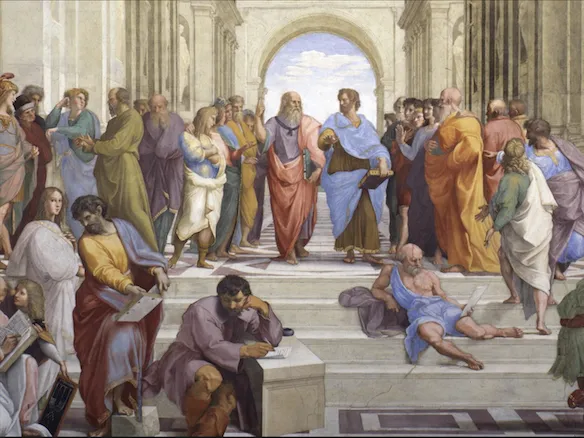
Above is "The School of Athens" by Raphael. Do you see a principal? A guidance counselor? I don't either.
Ancient Greece had no schools. They had teachers and they studied, but they learned what they wanted to and did so to expand their mind and understand the world. Forced learning was for slaves.
What the Ancient Greeks focused on was learning to use one's mind to see the world as it truly is.
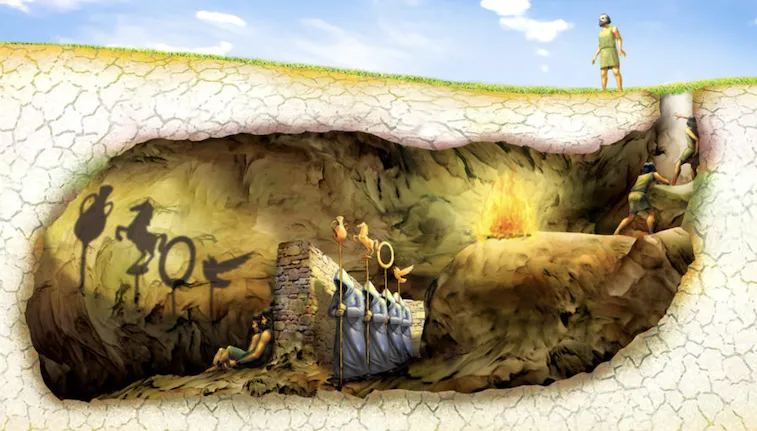
Plato's Allegory of the Cave depicted here. Inside the cave are prisoners who see shadows on the wall. They believe the shadows are the objects themselves. Above, a prisoner has broken free and stands in the sunshine, seeing the world as it truly is. Which one do you think most people are today? Which one do you think you are?
It is alright to trust your children. They are voracious learners! As unschooling expert and advocate Dayna Martin said,
Learning is like breathing. It’s really easy and it’s really joyful and expansive and powerful and it’s also instinctual. The only thing that gets in the way of learning is when it’s forced and when it’s controlled and when it’s regulated and when it’s scheduled and graded and measured. That’s what screws up the natural process of learning that comes really joyfully and easily to kids.
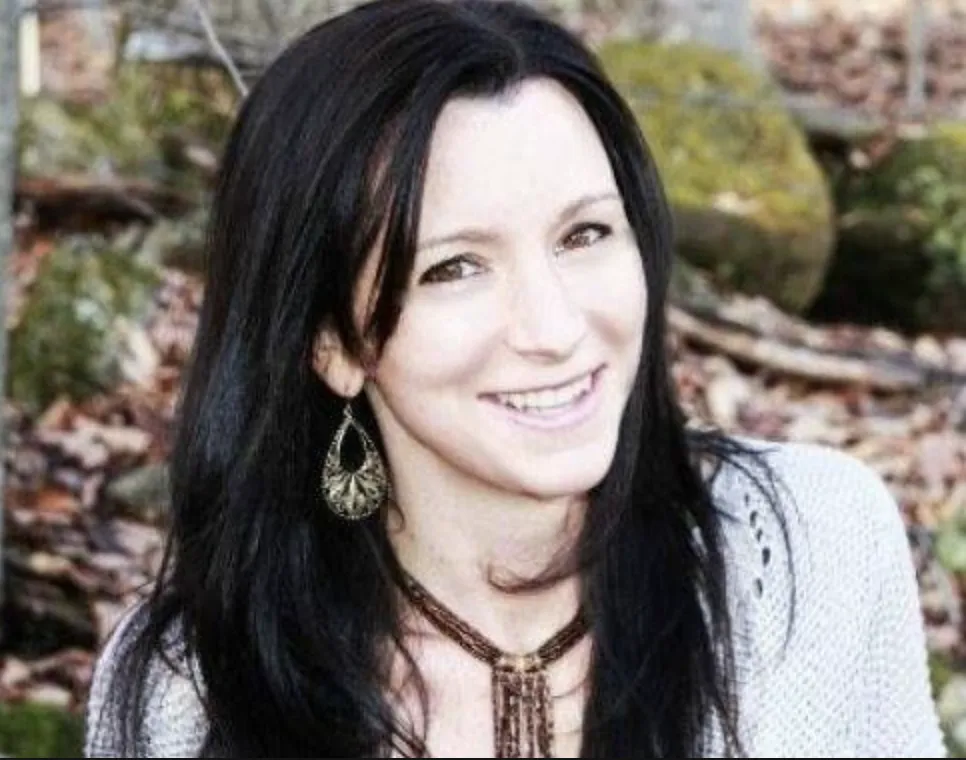
Mrs. Martin is successfully unschooling her four children, has been featured on numerous American TV shows, and is a published author on the subject.
The philosophy of unschooling is simple: Kids will learn (and learn happily) when they are ready and interested, just as they learned to walk and talk.
As a parent, you wouldn't force your baby to start walking, right? You wouldn't give them stern lectures and chide them that they were "Falling behind" the other kids, and that "They'll never get a good job without knowing how to walk."
Of course not! Instead you would give them the freedom to develop at their own pace, guiding, supporting, and encouraging them throughout the process.
Some parents worry about their teaching capabilities. Don't be afraid that you "Can't" or "Don't know how to" teach your child. Those fears are normal, but unnecessary! You don't need to "do school" at home. All you need to do is to understand, support, encourage, and love your child. You can do that better than any professional teacher can.
For more information, have a look at my other article on Unschooling. Or take a look at Dayna Martin's work here:
Radical Unschooling - A Revolution Has Begun
Remember that men like George Washington, Benjamin Franklin, Thomas Edison were unschooled and they turned out alright! There is always a way!
Thank you for reading. I hope you liked this article. I really care about this topic so if you want to talk further, add my WeChat and we can talk!

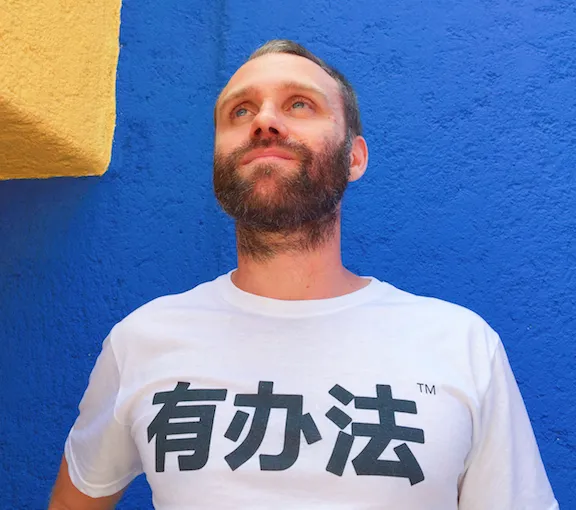
-Michael McGillicuddy
Hainan, China
Further Reading:
The Underground History of American Education - John Taylor Gatto
Huge, huge credit goes to this book for this post. It is fantastic and I highly recommend you check Mr. Gatto's work.The Deliberate Dumbing Down of America - Charlotte Iserbyt
The Closed Corporation - James Ridgeway
Cloning of the American Mind - Beverly Eakman
Educating for the New World Order - Beverly Eakman
Deschooling Society - Ivan Illich